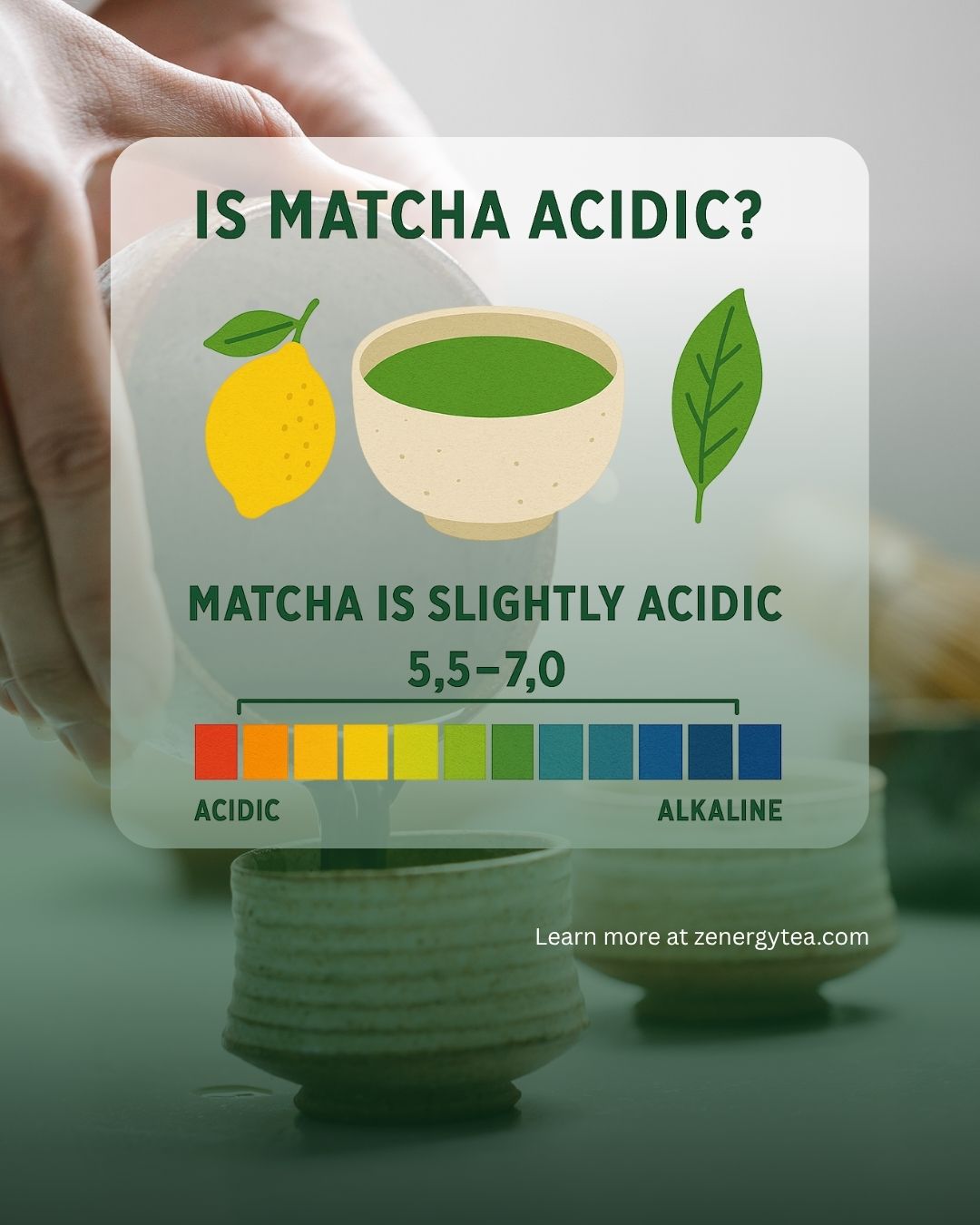
Is Matcha Acidic? A Tea Expert Explains
Share
Introduction
Many people who care about digestion or teeth ask, is matcha acidic? Drinks like coffee and soda can irritate the stomach. They may cause acid reflux or damage enamel. Matcha is different, but not everyone knows why.
This article answers that question with simple facts. We’ll look at pH, taste, how it feels in your body, and how to prepare it right.
Table of Content
What Does Acidic Mean?
Acidic means the pH level is below 7. The pH scale runs from 0 to 14. Water sits at 7 and is neutral. The lower the number, the more acidic it is.
Coffee has a pH around 4.5 to 5. Tea is closer to 6 or 7. Lemon juice and soda are more acidic. They fall between 2 and 3.
Understanding this helps us figure out where matcha stands.

What Is the pH of Matcha?
Matcha has a pH between 5.5 and 6.5. It depends on quality, water, and freshness. This makes it mildly acidic. It’s not as neutral as water. But it is much gentler than coffee.
People who feel sick after coffee often find matcha easier. That’s not a guess. It comes down to what’s in the powder.

Must Have Products For Beginners
Why Matcha Feels Easier on the Body
Matcha has caffeine, but it also has something special. L-theanine is an amino acid that helps calm the body. It balances the caffeine.
Matcha also lacks the oily compounds in coffee. Those oils can irritate the stomach. Matcha does not spike your stomach acid. It feels smoother, especially on an empty stomach.
Many people say matcha gives them energy without stress. That’s because of how it works in the body.

Is Matcha Acidic in the Body?
Here’s where it gets interesting. Some foods are acidic before we eat them, but alkaline once digested. Matcha is one of them.
It has many catechins and amino acids. These support a healthy pH balance after digestion. That means matcha can help reduce the effects of more acidic foods.
So, matcha may start acidic on the tongue but help your body feel balanced later.

What Affects Matcha’s Acidity?
Many things can change matcha’s pH. These include where it's grown, how it's processed, and how it’s stored.
Storage matters most. Air makes matcha oxidize. This can lower its pH. Heat and light break down key compounds. Moisture can make the powder sour.
To keep your matcha fresh:
Use an airtight tin or pouch
Keep it cool and dry
Avoid sun or steam
Finish within 30–60 days

Can Brewing Change the Acidity?
Yes. How you prepare matcha affects its taste and pH.
Hotter water extracts more bitterness. Water above 80°C can pull out more astringent parts of the tea. Soft or filtered water works better. Hard water may make it feel sharp or dry.
A good ratio is 1 to 2 grams of matcha with 70 to 80ml of water. Use water between 70°C and 80°C. Whisk well. This creates foam and makes the drink feel smoother.

Does Quality Change Acidity?
Yes. High-quality ceremonial matcha is less acidic than lower-grade powders.
Why? It comes from young leaves. These are shade-grown and picked early. They have more L-theanine and fewer tannins. Tannins cause bitterness and can make a drink feel sharp.
Culinary matcha uses older leaves. It’s often more bitter and rough. That doesn’t mean it’s bad. But it does make it feel more acidic.

Is Matcha Safe for Acid Reflux?
Many people with reflux or ulcers find matcha easier than coffee. But everyone is different.
If you have a sensitive stomach, start small. Drink matcha after a meal. Use cooler water. Try ceremonial matcha first.
Avoid drinking any tea on an empty stomach if you already have issues.
Can Matcha Harm Your Teeth?
No. Matcha is not strong enough to wear away enamel. It also does not contain sugar.
But like any drink, it helps to rinse with water after. This keeps your mouth clean and avoids stains.
Matcha can even help. It has catechins, which support a healthy mouth and may lower bad bacteria.
Is Matcha Good for Daily Use?
Yes, in most cases. Matcha offers energy, focus, and antioxidants. Its acidity is mild and does not build up in your system. Many people drink it every day.
If you are very sensitive to acid, try mixing it with oat milk. You can also enjoy it with breakfast or a snack.
Final Thoughts
Matcha is mildly acidic, but it doesn’t act like acidic drinks. It’s smooth, gentle, and supports balance in the body.
Compared to coffee, matcha is less harsh. It has a calm energy, a soft finish, and fewer stomach side effects. You can enjoy it every day with no problem.
Just use good powder. Prepare it with care. Store it well. Your body will thank you.
TL;DR – Is Matcha Acidic?
Matcha pH is between 5.5 and 6.5
It feels smoother than coffee
It supports body pH balance
Storage and prep affect acidity
Ceremonial matcha is gentler than culinary matcha


Aileen Gong is a food creator, sommelier, and graduate of the School of the Art Institute of Chicago.
She shares quiet, beautiful recipes that celebrate simple rituals and mindful flavors.
She grows blueberries in pots, hand-whisks her matcha, and believes every drink can be a small moment of peace.
If you want to buy yoga mats or books for beginners, you can check out more on our store
Products Featured In This Blog
Frequently Asked Questions
Is matcha better than coffee for acid reflux?
For many people, yes. Matcha is gentler on the stomach and doesn’t spike acid like coffee does.
Does ceremonial grade matcha have lower acidity?
Yes. Ceremonial matcha comes from young, shade-grown leaves. It feels smoother and less bitter.
Can I drink matcha every day if I have a sensitive stomach?
Most people can. Start with small amounts. Use cooler water and avoid drinking it on an empty stomach.
Is matcha acidic or alkaline after digestion?
Matcha is mildly acidic before digestion, but it supports an alkaline effect in the body after.


